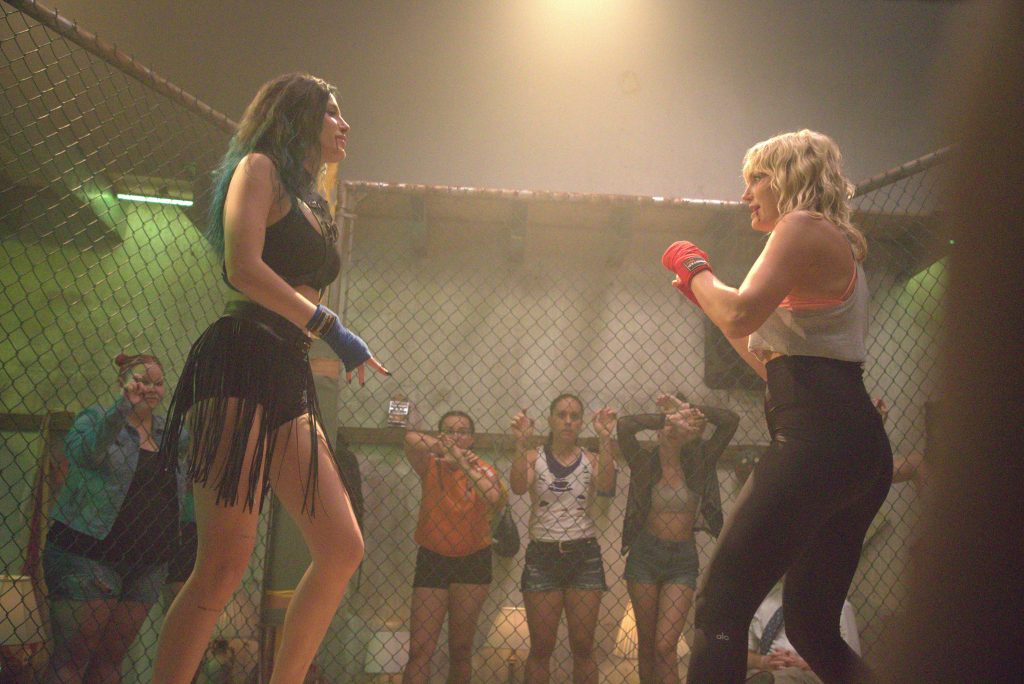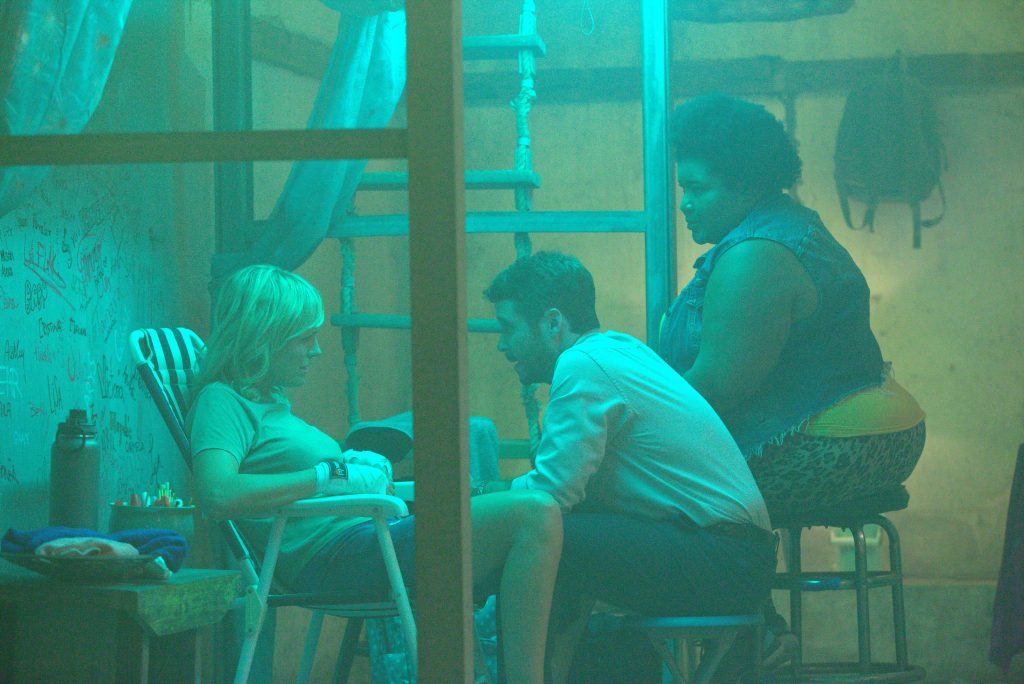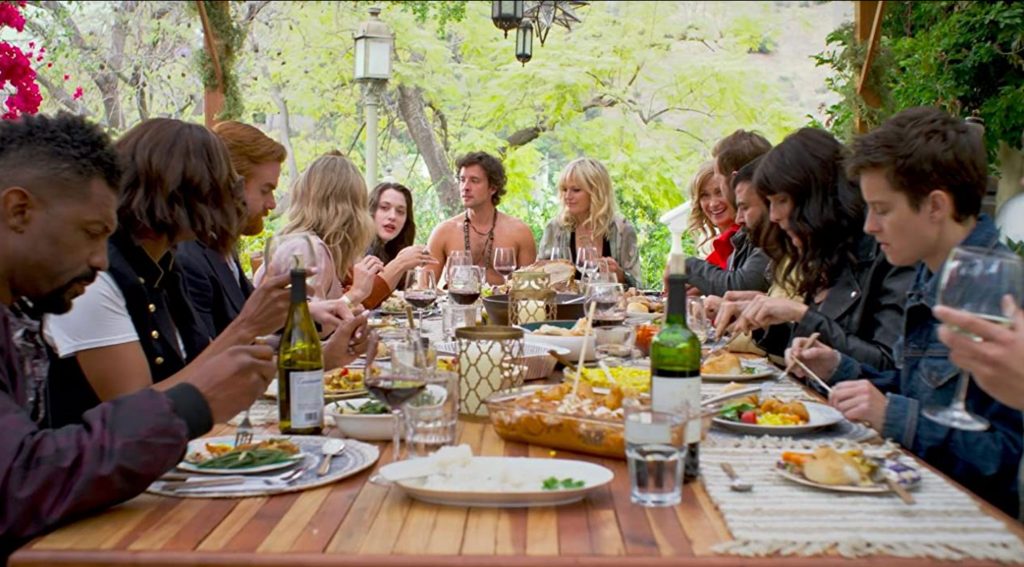December 9, 2020
by Carla Hay

Directed by Paul Leyden
Culture Representation: Taking place in an unnamed U.S. city, the comedy film “Chick Fight” has a predominantly white cast (with a few African Americans and Latinos) representing the middle-class.
Culture Clash: A woman who’s going through a financial crisis reluctantly gets involved in an underground all-female fight club.
Culture Audience: “Chick Fight” will appeal primarily to people who like dumb, crude and predictable movies.

When a movie has a title like “Chick Fight,” you know going in that it’s already got some level of stupidity. Even with expectations lowered, “Chick Fight” still manages to be a time waster by being relentlessly vulgar in its pathetic attempts at comedy and completely unimaginative in its weak attempts at serious drama. It’s very possible for entertainment to have foul-mouthed comedy that actually works well if there’s some insight or wit to the comedy. That doesn’t apply to “Chick Fight,” which is just a tacky, dull mess.
Directed by Paul Leyden, “Chick Fight” has an entire plot built around a warped idea that women who beat each other up for fun are doing something admirable and that this type of demented bullying is supposed to be therapeutic for them. It’s all just an excuse to show women getting bloodied and injured while trying to pretend that this type of violence is not misogynistic at all. After all, the filmmakers seem to be saying, if men can have underground fight clubs, why can’t women?
The problem is that a movie like “Chick Fight” (written by Joseph Downey) still perpetuates unrealistic, sexist stereotypes that portray women who fight as not to be taken as seriously as male fighters. Movies about men who have underground fights usually depict the realistic, long-term physical and psychological harm that these fights can bring. In a moronic movie like “Chick Fight,” viewers are supposed to believe that these female fighters can just wipe off their bloodstains, put on their makeup, and go about their regular lives when the vicious fight is over. And that phoniness is not just insulting to the female characters but also to the viewers’ intelligence.
For example, the movie has a ridiculous plot development where the main character Anna Wyncomb (played by Malin Akerman, who is one of the producers of “Chick Fight”) is completely shocked to find out that her late mother Mary (played by Julie Michaels in flashback scenes) started an underground female-only fight club. Mary was one of the club’s top fighters for many years, starting from when Anna was a teenager. (Anna is now supposed to be in her late 30s or early 40s.)
And yet, Mary was able to kept this secret from Anna the entire time that Mary was alive. When this story begins, Mary has been dead for nine months and Anna found out this secret only after Mary dies. Viewers are supposed to believe that Anna, who was very close to her mother, never saw any of her mother’s fight injuries during all of those years that her mother was involved in the fight club.
Even in the flashback scenes, Mary looks too pristine to be a “legendary” underground fighter, who realistically would be more bashed-up and bruised than Mary is. It’s an example of how the filmmakers still don’t want to depict women as capable of getting as down and dirty as men when it comes to these fights. The lack of realism when it comes to physical injuries is one of the biggest of many big problems in “Chick Fight.”
“Chick Fight” takes place in an unnamed city that’s supposed to look like somewhere in a U.S. state with a lot of palm trees, but the movie was actually filmed in Puerto Rico. At the beginning of “Chick Fight,” Anna’s life has been going on a downward spiral. Anna owns a coffee shop that’s failing financially. She’s so heavily in debt that one day, she wakes up to find that her Prius is being repossessed.
Anna desperately pleads with the middle-aged tow-truck operator (played by Norman Grant) not to take her car. “I can show you my boobs,” she tells him. He replies, “Yes, you could, but unless you’ve got $1,000 attached to each nipple, I’ve still got to take the car.” That’s what’s supposed to pass as comedy in this movie.
The crass and unfunny jokes about female body parts continue throughout the film. And the filmmakers have Anna’s best friend Charleen (played by Dulcé Sloan), who happens to be a cop and a lesbian, as one of the worst offenders of objectifying women, by portraying Charleen as a borderline sexual predator. Charleen is also the epitome of the formulaic stereotype of a large-sized African American woman being a loudmouth sidekick.
In one of the movie’s early scenes, Anna and Charleen (who are both single with no kids) are hanging out at Anna’s coffee shop and talking about their love lives. Anna says that she’s going through a “self-imposed abstinence,” while Charleen is scolding Anna for being celibate. Charleen ogles a pretty and innocent-looking barista at the coffee shop, who’s about 10 to 15 years younger than Charleen.
Charleen tells Anna: “I’m going to have her. I don’t even know if she’s straight or not, but I’m going to make that girl yell so loud, that only dogs are going to be able to hear her.” Charleen then sticks out her tongue, lecherously flicks it back and forth, and says to Anna: “See how fast I am with my tongue. I’m going to set her pubes on fire!” Anna doesn’t seem at all concerned that her best friend wants to sexually harass one of Anna’s employees.
That evening, Anna spends time with her widower father Ed (played by Kevin Nash) at his home. They’re seated in the backyard and talk a little bit about how much they miss Mary. Suddenly, Anna hears what sounds like someone in the house, even though Ed lives alone. She quickly figures out from Ed’s reaction that he’s got a new lover who’s in the house.
Ed admits it, but says that he’s not ready to introduce this person to Anna yet. However, Anna is too curious not to find out who it is. She walks quickly in the house, with a nervous Ed following her. And that’s when Anna meets her father’s new lover: a sassy man named Chuck (played by Alex Mapa), who looks young enough to be around Anna’s age. In addition to their age difference, Ed and Chuck have a height difference, since Ed is about eight inches taller than Chuck.
After Ed awkwardly introduces Chuck and Anna to each other, Ed tells Anna that although he loved his late wife Mary, he is pansexual and was in the closet about it during the marriage. With Mary’s passing, Ed says he can now feel free to express his true sexual identity. Anna is shocked, but she immediately accepts the situation and tells Ed and Chuck, “That’s great. I’m happy for you.”
Anna decides to make a hasty exit. But before she goes, she asks Ed and Chuck about their big height difference when it come to sex: “How does this even work?” Chuck replies, “Oh honey, it’s like a Great Dane trying to mount a Chihuahua.”
Although Anna has reacted with a friendly and very tolerant demeanor to what she’s discovered about her father, deep down she’s shaken to the core. She calls up Charleen and tells her to meet her at the coffee shop because she wants to tell Charleen some bombshell information and she needs someone to vent to about it.
Anna and Charleen meet up at the coffee shop, which is closed for the night, and Anna tells Charleen about her father’s confession that he’s pansexual. Charleen’s reaction is to laugh and say that Ed can now openly be part of the LGBTQ community. Anna and Charleen also discuss Anna’s messy life while sharing a marijuana joint. Charleen says she got the marijuana by stealing it from police evidence. Anna jokes that Charleen is the “worst cop ever.”
But what do you know, in a dumb movie like this, before Anna and Charleen leave the coffee shop, they just carelessly toss away the joint, which is still lighted, on the floor of the coffee shop. And the lit joint falls right into a puddle that happens to be an unidentified flammable liquid, thereby causing a fire that burns down the entire coffee shop. Predictably, Anna doesn’t have fire insurance.
Needless to say, Anna’s life goes from bad to worse. With her coffee shop gone, she struggles to find other work. Charleen tries to cheer up Anna one night by taking her to the female-only underground fight club, which is in a seedy area of the city in a dirty, warehouse-styled building. Anna later finds out that her mother Mary was the person who started this fight club.
The fighters do not use boxing gloves or wear mouth guards, although they can cover their hands with cloth or other fabric. The rules are that they can do anything during the fight, except for hair pulling, biting and eye gouging. Everything else is fair game. Every time someone wins a match, a dollar bill gets put up on the wall.
Charleen introduces Anna to a burly and tough woman named Bear (played Fortune Feimster), who manages the fight club with Charleen. Bear says she got her unusual name as a child because she was born with a lot of body hair. Later in the story, Anna finds out that Bear considered Anna’s mother Mary to be Bear’s mentor and biggest inspiration—so much so, that Bear keeps a poster and lots of mementos of Mary in Bear’s one-room apartment, which is in the same building and right next to the room with the boxing ring.
After a horrified Anna witnesses a brutal and bloody fight in the ring, Bear tells Anna that it’s a tradition for anyone visiting the fight club for the first time to fight someone in the club during that first visit. Bear also tells Anna that she has a choice to fight either Bear (who looks like she could do serious damage) or a terrified-looking woman with a slight physique who’s sitting in a corner by herself. Bear says that the other woman’s name is Carol (played by Marissa Labog), who’s a schoolteacher.
Anna predictably chooses Carol, who looks like she’ll be a much easier opponent than Bear. But (surprise, surprise) Carol turns out to be a tough fighter, who pummels Anna in the ring while using her legs to put Anna in a headlock. Anna is humiliated but also relieved because she thinks she doesn’t have to go through that experience again. But there would be no “Chick Fight” movie if she walked away that easily.
The fight club has a doctor named Roy Park (played by Kevin Connolly), who happens to be Bear’s brother. (Cue the joke about Bear’s full name being Bear Park.) Roy and Bear being siblings sort of explains why he’s the only man allowed in the room during the fights and why he would be willing to do medical exams for this illegal fight club as a favor to his sister. Roy examines Anna after the fight and determines that she’ll be okay.
But since Roy is the only man who’s allowed into the fight club room on a regular basis, you know what that means in a catfight movie like this: He’s going to be the center of a love triangle between two of the female fighters. And sure enough, after Anna gets the deluded idea that she’s going to honor her mother by becoming an underground fighter, Anna ends up taking on the fight club’s toughest competitor: Olivia (played by Bella Thorne), who’s about 15 to 20 years younger than Anna and who is also attracted to Roy.
This insipid movie puts up a fake front of being a feminist empowerment film, so it’s no surprise that “Chick Fight” reduces the story to the old cliché of two women fighting over a man. Olivia is supposed to be a tough-talking badass, but she’s actually a one-dimensional “mean girl.” Olivia has two sidekicks: Noel (played by Vitoria Setta) and Veronica (played by Ekaterina Baker), whose only purpose in the movie is to make Olivia look like she’s got some kind of posse. Anna is supposed to be “empowered” by taking on the challenge of fighting Olivia, but it’s actually quite pathetic that a supposedly mature woman who should know better is catfighting with someone who looks like she’s barely out of high school.
And really, the underlying motive for Anna and Olivia’s rivalry is that they both want to prove who’s more sexually attractive to Roy. However, Roy’s personality is extremely bland and he’s not very well-suited for either Anna or Olivia. And so, viewers can only conclude that Roy’s doctor salary has a lot to do with the attraction that Anna and Olivia (two very different women) have to Roy. And once again, it plays into outdated gender stereotypes that women need to find a man who makes more money than they do in order to have a happy love life.
At any rate, Anna needs a trainer. And fast. You’d think that with this female fight club existing for so many years, there would be some talented female alumni who still live in the area who could possibly mentor or train Anna.
But no. The filmmakers refuse to consider that qualified women could ever train other female fighters, because they make Anna go into training with a drunken and boorish has-been named Murphy (played by Alec Baldwin), whose main claim to fame is that he used to be the trainer of “Sugar Ray,” according to Charleen and Bear. Viewers are supposed to assume that “Sugar Ray” means Sugar Ray Leonard, but we can also assume that, for legal reasons, the filmmakers couldn’t use his full name, in order not to have Sugar Ray Leonard’s name associated with this crappy movie.
There’s also a not-very-funny subplot of Charleen being threatened by a female fighter named Betty (played by Nicole Paone), whose teenage son (played by Brian Dean Rittenhouse) was recently busted by Charleen for drug dealing to students. (The drug bust is shown in the beginning of the film.) Betty wants revenge on Charleen by challenging her to a fight. It should be noted that Paone, Akerman and Feimster also worked together in the 2020 comedy film “Friendsgiving,” another stinker of a movie with self-centered, obnoxious characters.
Sometimes, a bad movie is a little more tolerable if at least one of the main characters is appealing or if the acting is better than the material. But there’s almost nothing to like about this annoying group of characters in “Chick Fight,” and the acting is mediocre at best. The fight scenes are very unrealistic, because it’s easy to spot the difference between the stunt double and the actor. “Chick Fight” is so idiotic and unpleasant to watch that viewers will feel like it’s an assault on their time, patience and common sense.
Quiver Distribution released “Chick Fight” in select U.S. cinemas and on digital and VOD on November 13, 2020.


